While streaming is more and more likely to be the principal means by which you access your music these days, there are also millions of physical CDs floating around music collections just waiting to be played. The Rotel CD11 Tribute Compact Disc player is an affordable high-performance, no fuss player that can provide you easy playback of your silver disc collection without breaking the bank.
The “Tribute” aspect of the model name is a tip of the cap to famed engineer, Ken Ishiwata, who somewhat surprisingly was better known for his forty or so year association with Marantz, a company that is most decidedly not Rotel. Having departed Marantz in 2019 to join Rotel, he set his design chops on reimagining what a budget audiophile CD player could actually accomplish. Sadly, Ishiwata’s untimely passing meant Rotel had to finish the work on their own—hence this updated CD11 was released as a posthumous tribute to him.
What a budget CD player should do is, perhaps, somewhat obvious : spin a Compact Disc and output analog sound from the digital format. Still, some companies make this process more complicated than it needs to be, so it’s refreshing that the CD11 Tribute keeps things simple. As such, there are things this player does not do, but if the goal is to load and play a standard Compact Disc, then you’ve got one very approachable option. Let’s dig in a little deeper…
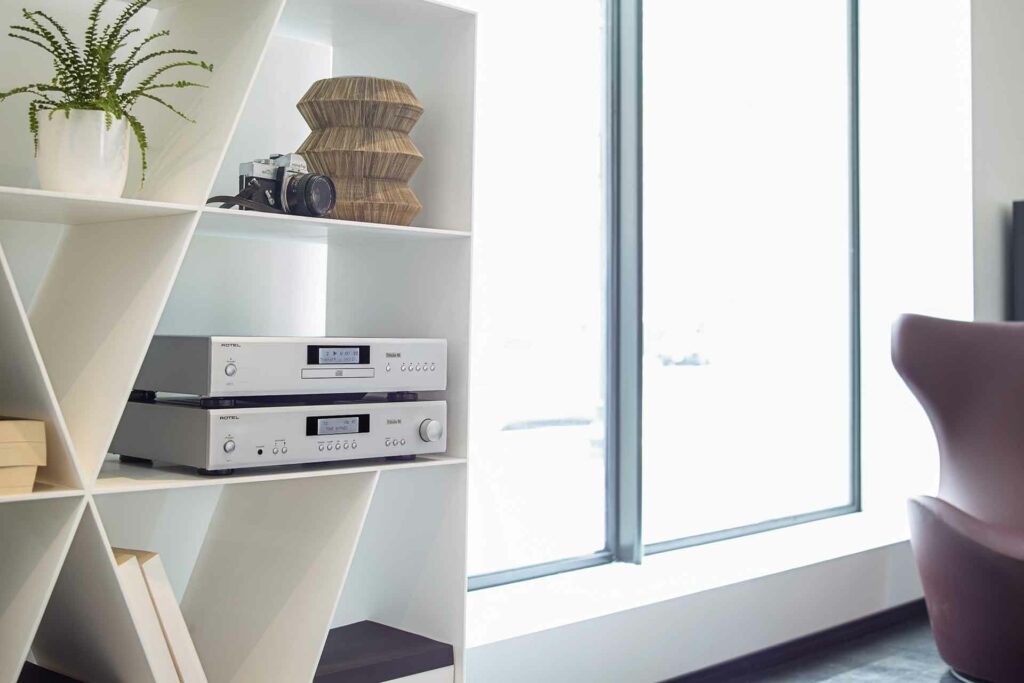
What makes the CD 11 Tribute Special?
- An internal Texas Instruments 192kHz/24-bit DAC handles the heavy lifting of converting the Red Book signal from digital to analog.
- Most of the upgrades over the original CD11 are under the hood. Ishiwata paid considerable and specific attention to improving the internal capacitors and adding internal damping to make the unit quieter.
- There is a front panel LCD screen that shows pertinent metadata. There are also set up options for screen brightness and an Auto Power off function. Other than that, there’s no real muss or fuss.
- There are both analog RCA and a digital output (in case you want to use this as a transport instead of a player, with the addition of your own DAC) on the back of the unit. A rear mounted 12V trigger, RS-232 socket, a 3.5mm Rotel Link used to pair the CD11 with other Rotel devices (like the matching A11 Integrated Amp, and an IEC-C15 power cord complete the connections. In other words, the CD11 Tribute is exactly as simple as it needs to be in terms of connectivity, but no simpler.
- In an age where advanced technicality is an apparent goal, I find the simplicity of the Rotel CD11 refreshing. I only spent about 10 minutes unpacking and hooking it up to my preamp and about 10 seconds more to load an actual Compact Disc.
- All control functions are on both the front of the unit and the included remote.
- I especially like the fact that the Rotel CD11 comes in both silver and black. You normally don’t get such options at this price point.
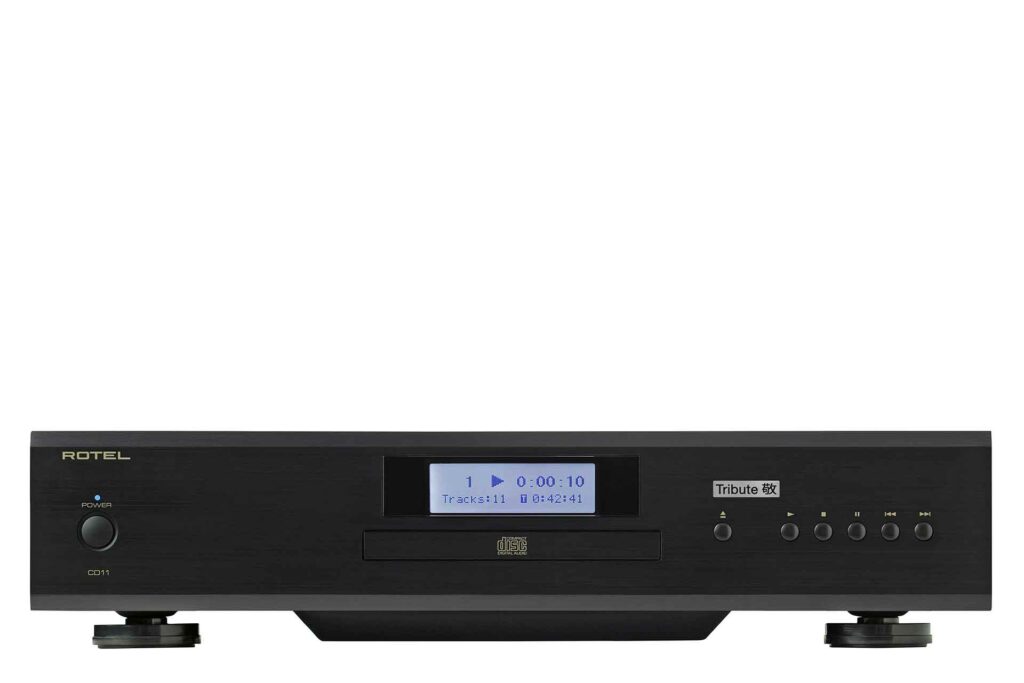
Why Should You Care About the Rotel CD11 Compact Disc Player?
For many systems, a component to play a physical CD may not be the primary means to enjoy digital music. Streaming and music servers have taken the dominant role in that domain. So when selecting a CD player, spending huge sums of money probably doesn’t make as much sense these days. There are times, however, when a better-than-big-box CD player is the desired device. When you look at the range of included features compared to the price point, the impressive performance and ease of use, the Rotel CD11 is a worthy addition to any audiophile caliber audio system.
Some Things You Might Not Like About the CD11 CD Player…
- If your audiophile disc collection includes a wealth of SACDs, DVD-Audio discs, and similar media with higher resolution than 44.1kHz/16-bit you need to look elsewhere. This device only plays standard Red Book Compact Discs.
- It also won’t decode the peak soft limiting of HDCD discs, if you have any of those in your collection. (If you collect the regular disc releases from the Grateful Dead Vault, you do whether you knew it or not.)
- There are no USB or network connections. While there are competitive models that provide a USB input, Rotel elected not to do so. This is a closed-end, performance-oriented Compact Disc player and nothing more.
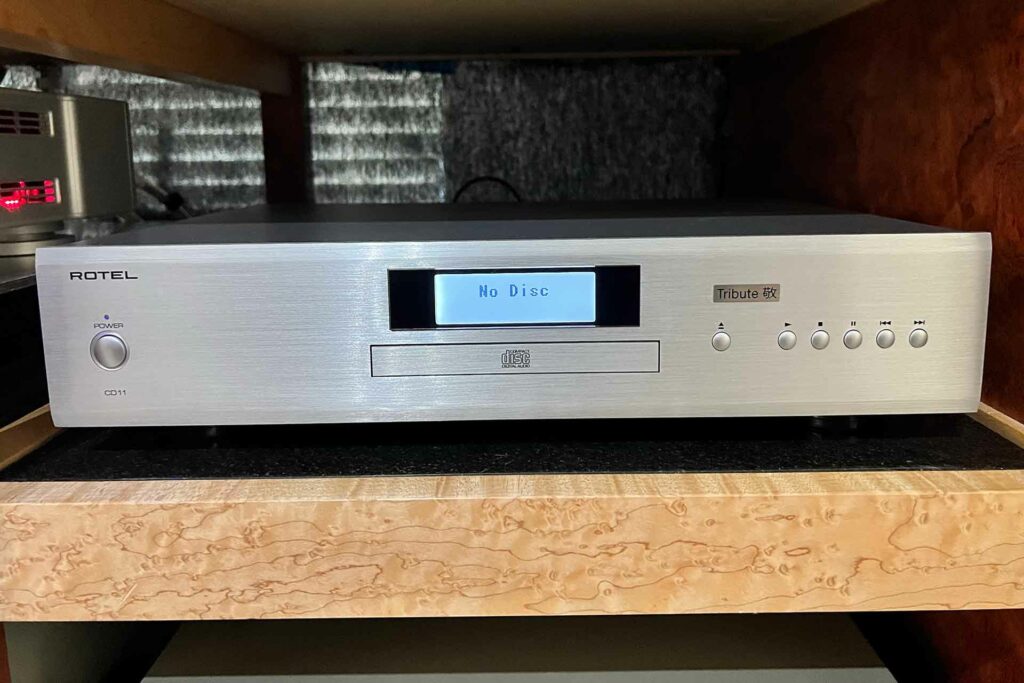
Listening to the Rotel CD11 CD Player…
On Chicago’s seventh release Chicago VII, the very lively track “Mongonucleosis”—written by James Pankow—begins with an upbeat, dynamic drum track by Danny Seraphine. Played through my pricey music server, the drums were quite concussive and there was above average impact, enough to really make this intro stand out. When the percussion came in, and finally the horn section, the full width and depth of the live zone of my audio room was filled with precise image placement, large scale dynamics and remarkable clarity. Playing the same song through the Rotel CD11 Tribute, the first requirement was to level match the amplitude. Once done, the imaging was exceptional, as was the clarity. However, the dynamics and impact were noticeably less forceful. And while the CD11 did sound very good, it was obviously surpassed by my DAC and server. But given the overwhelming disparity in cost and performance, I felt like the Rotel CD11 Tribute performed exceptionally well.
For Dana Fuchs’ “Set It On Fire”, I made a direct comparison of the physical CD to a CD-quality version streamed from Qobuz. Fuchs’ sound is part rock, part blues, with emphasis on her sultry yet powerfully dynamic voice. In fact, she once had the lead role in an off-Broadway production about Janis Joplin. Playing first this track on the CD11 Tribute, I was instantly drawn in. Her voice filled my listening room completely. Through the CD11 Tribute, I found the dynamics to be quite robust. The clarity allowed instruments to come through very cleanly and clearly. Perhaps most impressive was the imaging. As I have experienced in each CD I’ve played through the CD11 Tribute, the imaging was basically equivalent to the superb imaging my system typically produces in a digital format. The presentation was a wall of sound from side to side and front to back, all eighteen to twenty feet from my listening chair. When I compared the track to the Qobuz version, I did reduce the preamp volume a few clicks, but otherwise, both tracks were very consistent with each other. I stream through my server, which has a custom software package to improve streamed music. That the CD11 Tribute was every bit the equal of a streamed version is a testament to the quality of this device.
Generally speaking, comparing the CD11 Tribute to my server and DAC, I found the CD player almost indistinguishable in terms of imaging, slightly less dynamic, slightly narrower on the bass performance, and the clarity had a slight increase in signal-to-noise ratio. On highs, there was a softer, less of a razor-sharp edge to instruments such as a sax and trumpets. However, as I listened to CD after CD, I came away with the undeniable feeling that this unit performs far better than the price would have me believe.
Does The Rotel CD11 Tribute Have Any Resale Value?
There are a number of ways to consider this question. How many people will realistically sell a $599 CD player after using it for a few years? If you don’t really plan to get rid of it, does resale value even matter? Perhaps not.
Since its introduction, there have not been many of them to appear on the used market. I found one on eBay for just under $300, which seems about right. For that reason, and given its recognized sonic quality, the CD11 Tribute should hold its value with other players in a similar price class. It isn’t as if advancements to CD playback or digital-to-analog conversion are likely to make this one obsolete anytime soon.
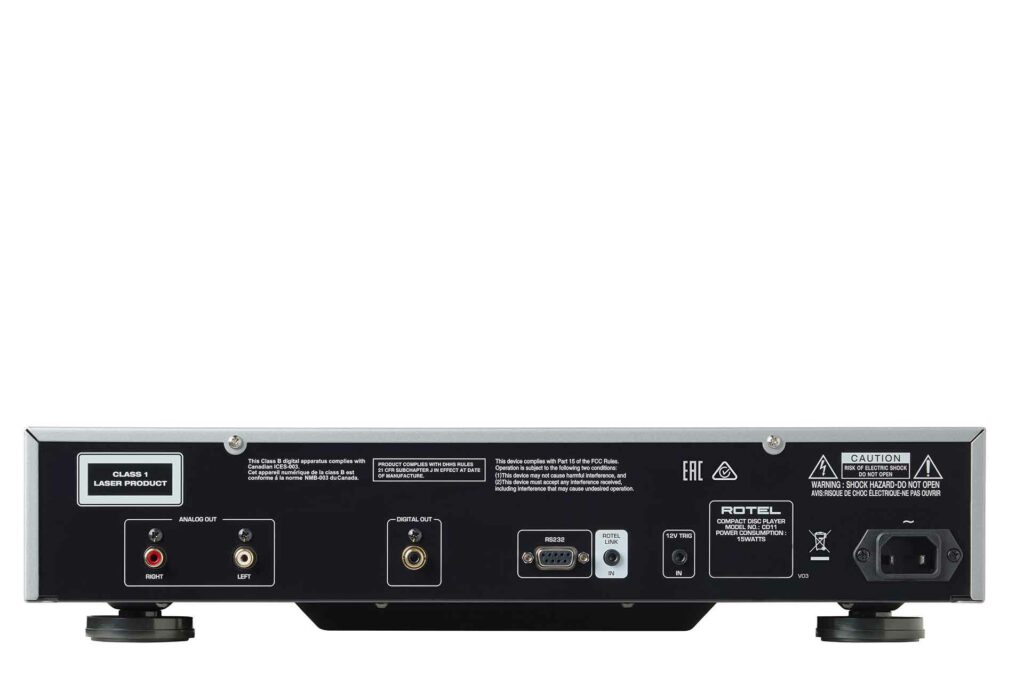
Who Is the Competition for the Rotel CD11 Tribute Compact Disc Player?
For the sake of argument, let’s filter out inexpensive sub-$100.00 players found at many big-box stores. Looking at just a few competitors, ever present is the primary Rotel nemesis Marantz. Their Marantz CD6007 (buy at Crutchfield) at a retail cost of $799.00 is a very worthy competitor. Like the CD11 Tribute, the Marantz CD6007 also uses a 192kHz/24-bit DAC chip. It will be up to the user to decide if the Wolfson DAC in the Marantz is superior to the Texas Instruments in the Rotel. The basic features are the same and even at $200.00 more, the CD6007 does not play SACDs or DVD-Audio and the like, nor will it decode HDCD, but it will play them thanks to backward compatibility of the format.
Another worthy competitor is the NAD C 568 player retailing for $899.00. LIke the Rotel CD11, the NAD player has analog and digital out connections and also a 12V trigger used for other NAD devices. It also uses a Wolfson DAC, which once again raises the preference question. Note: many of today’s DAC chips are so good in terms of raw performance that you might not be able to hear a difference, in that they both accomplish their design mission quite nicely. We’ll let you decide.
Lastly is the Cambridge Audio AXC 35. Like all the rest, this is a CD player only thus no SACDs. It also features analog and digital outputs yet at a retail cost of $399.00, is the least expensive of the bunch. It uses a Wolfson WM8524 DAC chip for conversion of digital to analog. All three comparative models come with full-featured remote controls.
For the most part, any of the brands in this category are offering a unit comparatively similar to the other competitors in the price class. They are all very similar in features and cost within $300.00 of each other. While I did not perform a direct comparison of each competitive model, it is a reasonable supposition the performance of any of them will be quite similar. A choice could be as simple as which brand the user prefers.
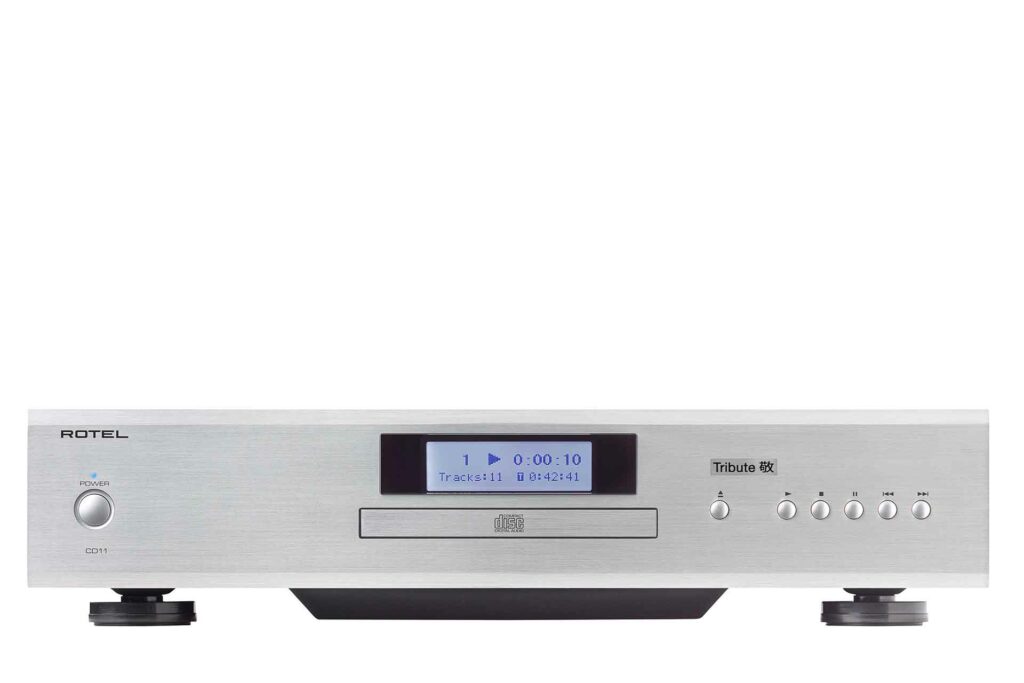
Final Thoughts on the Rotel CD11 Tribute CD Player
My first choice for digital will always be a physical CD ripped to my music server. Day in and day out, this provides the greatest sonics in my system often when comparing to streaming or other formats. Having said that, however, it should not be assumed that the Rotel CD11 Tribute is not an exceptional sounding CD player because it is, especially for the price. I listened to countless CDs on the Rotel CD11 Tribute and I could not find a major flaw in anything I heard. For an entry level, budget audio system, and one with a library of physical discs, the CD11 will absolutely hit it out of the park. For media collections short on SACD and DVD-Audio, the CD11 is a unit that will easily provide hours of listening enjoyment. The ease of use and superior sonics make it an admirable addition to any audio system and one that may be enjoyed disc, after disc, after disc.




Which model DAC is used? Who makes the CD drive mechanism? Cheap Chinese drives typically fail after a couple of years use. What is Rotel’s sparing policy (number of years guaranteed?).
Great
I am very excited to hear that your server sound better than Cd player.. disregard of the pricing difference. May I ask what are the components of your server set up and how they are connected to your system and what is your DAC.. I have tried many times to rip my own CD into my computer and play thru. with the same DAC shared by the my CD player..but original CD disc with CD player always way better than my computer WAV file thru. the same DAC..hence I am eager to learn how u develop such amazing system
Hey Terry,
I just today (Nov 2) saw your response and your question of my music server. Sorry for not responding sooner! My server is the Memory Player 64 designed by Quantum Physicist Mark Porzilli. Mark has two patented software programs for the Memory Player. One is called I.D.E.A.S (Impulse Discharge of Events in Atemporal Space). IDEAS removes vacancies in the digital bitstream and replaces non music bits commonly introduced by Error Correction software. The second is what Mark calls De Fractionalized Slot Memory. This is a memory system that realigns the bits into a numerically cognizant order. Think 1,2,3,4 as opposed to 2,1,4,3. Bits out of order is a major cause of jitter in digital systems. It also utilizes only one tick of the clock as opposed to 16 so jitter is automatically reduced by 16 times over conventional systems. The Memory Player is unique in that it takes a standard physical CD, converts it to a 64 bit format and plays it back at 32 bit. All of the software was written by Mark. In fact, there are six custom software programs in the MP. One, for instance, is a Clock Mapper which combines all playback functions onto one master clock and vastly improves performance over the antiquated Rubidium isotope clocking system used in almost every master clock in the audiophile hobby. In fact, Mark has completely redesigned the Memory Player and now has a two box solution with the power supply in a separate enclosure. Some of these processes are available as a download and can be installed on a conventional system.
I encourage you to look around. The MP is very unique in the audiophile world. I am not aware of any device, at any price, that reduces jitter throughout the entire computer and to a lower level. In that, the MP stands alone. And in digital music, even streaming (especially streaming!), higher jitter means worse sonics.
As to your other question, what DAC I am using. That would be the Bricasti M21 Platinum Edition.
Use of these components together makes for one impressive delivery of digital music. Thanks for your interest in my system and best of luck on your audiophile journey!!!
Paul